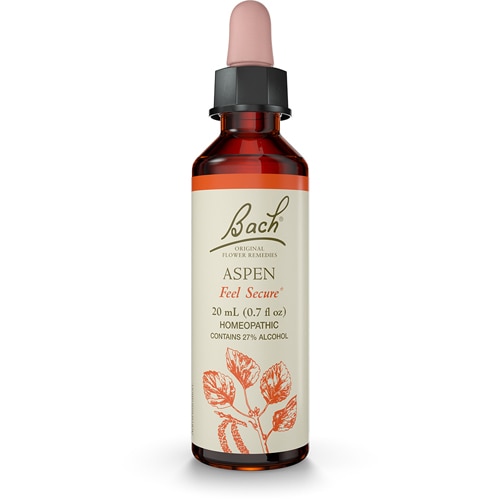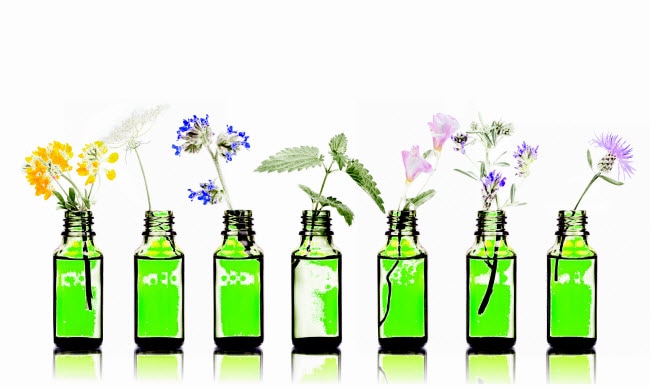Few of us are immune to the power of flowers. From a bouquet of bright yellow daisies to a pot of hot pink geraniums, we all know that flowers can prompt a whole host of positive emotions.
But did you know that their essences can also be used to encourage optimal health?
It’s not news—but it is newsworthy. Botanicals have comprised most of the shelves in nature’s medicine chest for thousands of years, but the potential benefits of flower essences—that is, the distilled vitality of a flower—first hit the scene in the 1930s. Then, English physician and homeopathic doctor Edward Bach sought out a new form of healing. He found it in the garden, where he began noting that certain plants could alleviate negative thoughts and feelings, thereby addressing what he believed to be the root cause of physical ailments: The conflict between one’s soul and their outlook and behaviors. Determined to resolve this internal battle—which he believed created energy blockages and emotional disharmony—he created 38 floral remedies. Unknowingly, he also made one of the largest modern contributions to what’s deemed vibrational healing—a niche of natural medicine that includes sound therapy and essential oils.
What are flower essences?
But what, exactly, does the “vitality of a flower” mean—and how can it be used for health?
Separate from essential oils, which are derived from the chemical components of a plant, flower essences do not contain flower material. Rather, Bach’s original method—which is more or less used today—required soaking flowers in water to “imprint” their energy. This energy was then preserved with alcohol, such as brandy, and either taken under the tongue or applied topically—for example, applied to acupuncture points, dropped into a bath or added to lotions. (Most flower essence products today, it should be noted, are alcohol-free.)
While science has yet to find a difference in impact between flower essences and a placebo, some of our leading health experts are huge advocates of this alternative therapy. Chief among them? New York Times bestselling author Christiane Northrup, M.D. “Unlike pharmaceuticals, which suppress symptoms, flower essences work by the principle of resonances in the subtle body where imbalance starts,” she says. “In other words, the action of flower essences is energetic, not biochemical.”
She also shares the belief that all plants “have a unique vibrational energy pattern” and that flower essences may either work right away or begin to show their benefits “over days or weeks, layer by layer.” Northrup, among others, believes that flower essences can increase clarity and focus, inspire joy and serenity, eliminate worry—even fuel creativity.
How can flower essences benefit your health?
Believed to be harmless, flower essences can further be called upon for a broad range of complications. As herbalist, nutritionist, and energy healer Erin Lovell Verindeer told Vogue, she uses flower essences in her clinics to address anxiety, depression, trauma, and fatigue, among other issues.
“I feel flower essences really shine with emotional conditions and work in such a subtle yet potent way to bring the support needed. Intuitively, people are drawn to the one they seem to need at the time.” Northrup seconds this: “All flowers have an innate wisdom that they lovingly share with us. Every flower has its own message—and its own therapeutic properties. Chances are, if you are particularly attracted to a certain flower, it’s because on a deep emotional level it is providing something that you need in life.”
This traces back to Bach’s theory, whose list of remedies were tailored to very specific traits or behaviors. Aspen, for example, could be used to relieve the fear of unknown things. Elm, meanwhile, could be called upon to support those who are overwhelmed by responsibilities; larch could be utilized to bolster confidence.
The debate on the efficacy may be ongoing, but what remains true is that flower essence therapy asks people to identify where and how they feel...off. Whether it’s a placebo effect or not seems to be a moot point. By determining that you’re not just feeling uncertain but are suffering from unwanted thoughts and mental arguments (white chestnut, Bach believed, was the remedy for this), you’re able to address the problem at a profound level; by noting that you’re, say, apathetic (wild rose), you can use flower essences as a complement to a regime that also includes more exercise or talk therapy.
By tackling your mental, emotional and spiritual health through flower essences, you may be motivated to make lifestyle choices that directly impact your physical health. (Some products, such as Self-Heal Flower Essence, are created specifically to promote responsibility for taking control of one’s well-being.) In other words, flower essences have the potential to stimulate healing—and, as we all know, that begins with ourselves. Flower power, indeed (and then some).




